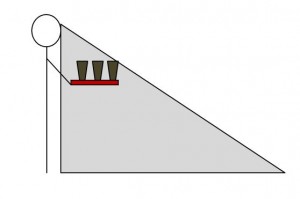Remember those bubble domed cars from The Jetsons that we were all supposed to be driving around in by now?* While they probably would be only slightly less safe than a Suzuki Samurai* in a rollover test, they did have one great design benefit. There would be no blind spot. No fear of a Vespa hanging out just over your right hand shoulder. It would have a true 360 degree visual field. Unfortunately, for the time being, you have to keep an eye out for the other cars hiding out in your blind spot.
As a server, there is a blind spot we have to look out for as well. It is an area that we are not able to see. Unfortunately, guests and children fail to recognize our blind spot. This leads to far too many completely unnecessary accidents. Today, I wanted to point out this fact to foodies in hopes of preventing future accidents. Heed this advice and you can avoid being just another statistic.
The creation of a server blind spot occurs when a server is carrying a tray. Most people have a large natural range of vision. Our eyes are designed to allow our peripheral vision to catch most of what is happening around us. When we carry things in front of us, our vision is blocked by those items. Everyone has encountered this fact while moving or carrying a laundry basket up stairs. For servers, it is generally a tray loaded with drinks. The taller the drinks, the larger the blind spot. For visualization purposes, I have drawn a picture:
So what does this mean to you as a guest? It means that you are putting yourself at risk when you enter or place items in the blind spot. Servers generally operate under the premise that the aisles a restaurant is designed to have will be free of items. This is why they are aisles. After walking down the aisles a few hundred thousand times, we begin to develop a confidence that guests will obey the social norm and not place random belongings in these aisles. This is something we learn in childhood.
Typically, I don’t leave random items in harm’s way by placing them on sidewalks, in the street, or other high traffic places. This is why my dad got so annoyed when I left my bike in the driveway. It is also why when he eventually ran into my bike in the driveway I received little sympathy. Parents stepping on their child’s toys yell at the kids for leaving the toys where they don’t belong. I can only imagine a mother stepping on a Lego* with bare feet being told by her child to be more careful next time. We learn as children that it is rude to just leave our toys laying anywhere.
As adults in restaurants, we leave far more valuable things in the aisles. Purses, laptops, and even children are left in the aisle that is supposed to be clear. These are items that should not be kicked, bumped, or stepped on, but they are left as unexpected landmines for servers to discover. If they are harmed in anyway, it is the server’s fault. In spite of the fact that we were all taught as children to be more responsible with our belongings.
When the inevitable situation plays out where disaster occurs, it is always the server’s fault. A server doing their job trips over an oversized purse, is sent to the emergency room, and spills a tray of coffee on a group of senior citizens. When the manager arrives with his “Why the hell did you leave your roller skates* sitting at the top of the stairs†look he is met with an odd response. A guest asking “Why wasn’t your server looking where they were walking?†and demanding their purse be replaced. I don’t know about you, but I would have needed rockets on those roller skates* to get away from my parents if I gave them that sort of reply after tripping on my toys.
The moral of the story is that you should respect the aisle. No one wants to harm any of your belongings. If you place your belongings where they don’t belong, part of the blame belongs with you. Serving is not an easy job and requires focus on performing multiple tasks at the same time. Unlike gymnasts or divers, we do not receive a bonus when you increase the degree of difficulty. We should all work together to prevent such accidents and make every guest’s experience worthy of a gold medal.
*If you are too young to know what these things are, please consult Wikipedia or ask your parents to prevent the rest of us from feeling old.



